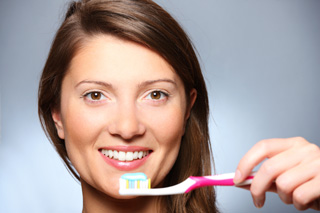| Tooth discoloration: Is there anything you can do? |
Lots of our patients ask us about getting—and maintaining white teeth. Many adults struggle with tooth discoloration and find it embarrassing to show off their teeth when they smile. There are several causes of tooth discoloration, and once we identify the cause of your tooth discoloration, there are a variety of treatment options at our office that can restore the shade of your teeth, as well as your confidence. So, what causes tooth discoloration? There are a wide range of reasons why your teeth may not be as bright as you want them to be. While some are directly under your control, such as brushing, avoiding smoking or avoiding coffee or other drinks that are known to stain your teeth, others may not be preventable. Here are several causes of tooth discoloration:
What treatments are available for tooth discoloration? After determining the cause of tooth discoloration during your initial visit, we can suggest treatment options. Over-the-counter whitening agents might help, but in-office professional whitening treatments provided at our office are more effective at giving you the brighter shade you’re looking for. In situations where whitening agents will not work, bondings or veneers are among the alternative options available to treat tooth discoloration. One of the easiest ways to reduce tooth discoloration, however, is through prevention. And that begins with you: Avoiding drinking red wine, soda, or coffee and stopping your use of tobacco products are all great places to start. If you drink any of the aforementioned beverages on a regular basis, we suggest you brush your teeth immediately afterward or swish with water to reduce staining. If you think you may have tooth discoloration, or are displeased with the whiteness of your teeth, please give us a call. We can identify substances that may be causing the problem. |
Copyright © 2013 Sesame Communications
|
